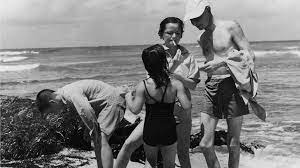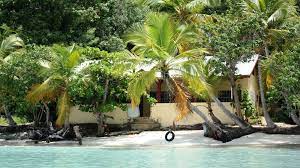Oppenheimer & St. John: A Profound Connection
Dr. Robert Oppenheimer’s Relationship to St. John, USVI
Dr. J. Robert Oppenheimer, known as the “father of the atomic bomb,” played a crucial role in shaping the course of history during World War II. However, his significance goes beyond his contributions to science and nuclear weapons development. Less known is his intimate connection to the Caribbean island of St. John, US Virgin Islands (USVI), and the profound impact it had on his personal life and career. This essay delves into the intriguing tale of Dr. Oppenheimer’s relationship with St. John and how this paradise island influenced his life and legacy.
Discovering St. John: A Place of Solace
In the early 1930s, Robert Oppenheimer was a brilliant young physicist with a growing reputation in the scientific community. He taught at the University of California, Berkeley, and conducted research at the California Institute of Technology. Despite his academic success, Oppenheimer struggled with personal issues, including bouts of depression and emotional turmoil.
In 1938, Oppenheimer took a sabbatical to escape the pressures of academia and visited the Virgin Islands, which were not yet a US territory. It was during this time that he first encountered the beauty and serenity of St. John, the smallest of the three main USVI islands. The island’s lush landscapes, pristine beaches, and tranquil atmosphere provided a stark contrast to his fast-paced academic life, offering him solace and peace of mind.

Oppenheimer and family in St. John
A Connection to the Island’s Cultural Heritage
St. John’s allure extended beyond its natural beauty for Oppenheimer. The island’s history and cultural heritage fascinated him. St. John has a rich history of indigenous populations, colonial influence, and the legacies of the sugar cane industry and slavery. During his time on the island, Oppenheimer delved into its past, learning about the struggles and resilience of its people.
Oppenheimer’s curiosity and interest in the island’s history were not limited to academic pursuits. He engaged with the local community, learning about their traditions, customs, and unique way of life. This cultural exchange played a significant role in shaping his worldview and fostering a deep sense of appreciation for diverse perspectives.
St. John: A Place for Intellectual Contemplation
St. John also became a place of intellectual contemplation for Oppenheimer. The tranquility and isolation of the island provided him with the ideal environment for deep thought and introspection. Surrounded by the natural beauty of St. John, Oppenheimer found inspiration for his scientific work and philosophical musings.
His visits to St. John allowed him to step back from the intense pressures of the academic world and the political climate that was growing increasingly volatile with the outbreak of World War II. This retreat to the Caribbean paradise offered him the clarity of mind necessary to grapple with the moral and ethical implications of his scientific pursuits.
St. John’s Influence on Oppenheimer’s Work
Beyond its influence on his personal life, St. John also had a subtle impact on Oppenheimer’s scientific work. His time on the island deepened his understanding of the interconnectedness of nature and the universe. The island’s ecosystem and geological features fascinated him and contributed to his broader understanding of physics and the natural world.
Moreover, Oppenheimer’s relationship with St. John helped shape his views on the responsible use of scientific knowledge. As he developed the atomic bomb at the Los Alamos laboratory, he wrestled with the moral implications of his work. This ethical struggle was, in part, informed by the contemplative atmosphere and introspection he experienced during his time on the Caribbean island.
The Legacy of St. John in Oppenheimer’s Life
The bond between Oppenheimer and St. John endured throughout his life. He returned to the island multiple times over the years, seeking respite from the pressures of his professional life. Even after the successful test of the atomic bomb at the Trinity site in New Mexico in 1945, Oppenheimer found himself drawn back to St. John, where he could find tranquility and reconnect with nature.
Tragically, his connection to the island was interrupted by the controversies surrounding his political affiliations and the subsequent revocation of his security clearance during the McCarthy era. Nonetheless, Oppenheimer’s affection for St. John remained undiminished.

The Oppenheimer property in St. John pre Hurricane Irma
Conclusion
Dr. Robert Oppenheimer’s relationship with St. John, US Virgin Islands, transcended the boundaries of scientific achievement. The island provided him with a sanctuary of beauty, serenity, and cultural diversity, shaping his personal and intellectual growth. St. John offered him a space for reflection and introspection, influencing not only his scientific work but also his views on ethics and the responsible use of scientific knowledge.
While Dr. Oppenheimer is remembered primarily for his role in the Manhattan Project, his connection to St. John reveals a more multifaceted and human side to this brilliant scientist. The island’s impact on Oppenheimer’s life is a testament to the profound influence that natural beauty and cultural exchange can have on an individual’s perspective and the choices they make in shaping the course of history.
